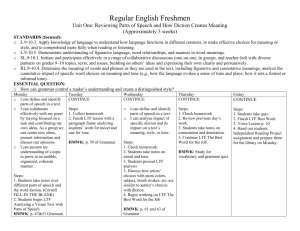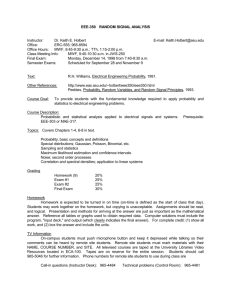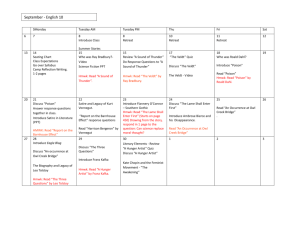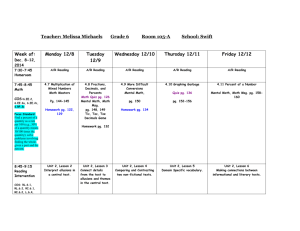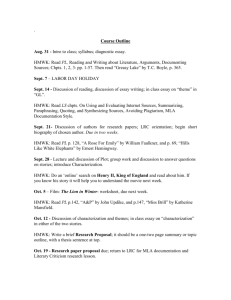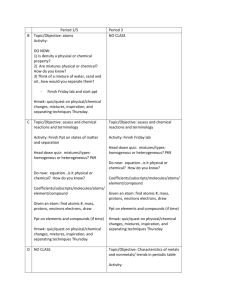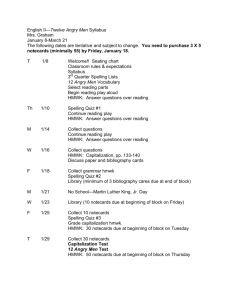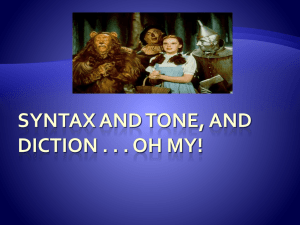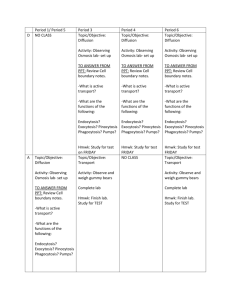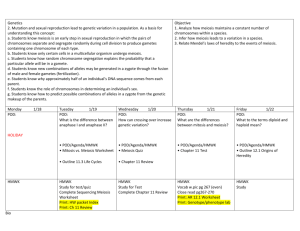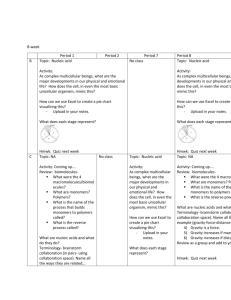Daily Unit Outline - Glasgow Independent Schools
advertisement
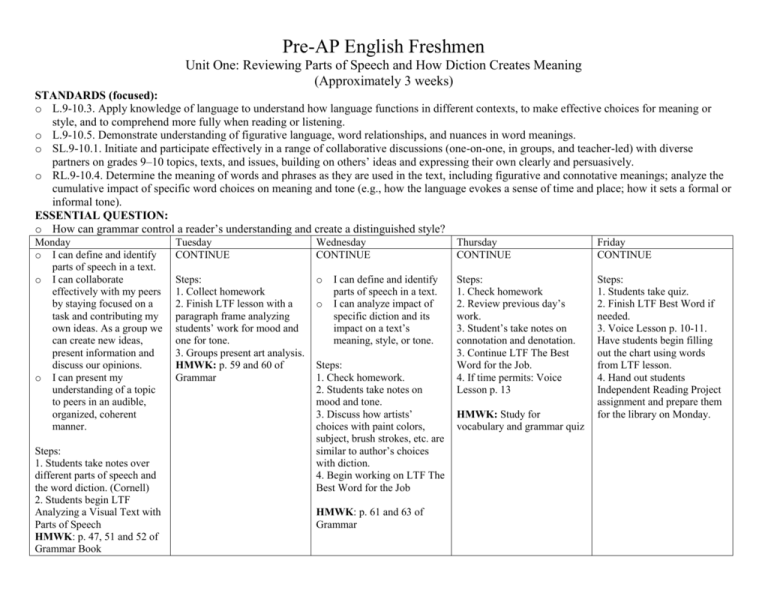
Pre-AP English Freshmen Unit One: Reviewing Parts of Speech and How Diction Creates Meaning (Approximately 3 weeks) STANDARDS (focused): o L.9-10.3. Apply knowledge of language to understand how language functions in different contexts, to make effective choices for meaning or style, and to comprehend more fully when reading or listening. o L.9-10.5. Demonstrate understanding of figurative language, word relationships, and nuances in word meanings. o SL.9-10.1. Initiate and participate effectively in a range of collaborative discussions (one-on-one, in groups, and teacher-led) with diverse partners on grades 9–10 topics, texts, and issues, building on others’ ideas and expressing their own clearly and persuasively. o RL.9-10.4. Determine the meaning of words and phrases as they are used in the text, including figurative and connotative meanings; analyze the cumulative impact of specific word choices on meaning and tone (e.g., how the language evokes a sense of time and place; how it sets a formal or informal tone). ESSENTIAL QUESTION: o How can grammar control a reader’s understanding and create a distinguished style? Monday o I can define and identify parts of speech in a text. o I can collaborate effectively with my peers by staying focused on a task and contributing my own ideas. As a group we can create new ideas, present information and discuss our opinions. o I can present my understanding of a topic to peers in an audible, organized, coherent manner. Steps: 1. Students take notes over different parts of speech and the word diction. (Cornell) 2. Students begin LTF Analyzing a Visual Text with Parts of Speech HMWK: p. 47, 51 and 52 of Grammar Book Tuesday CONTINUE Wednesday CONTINUE Thursday CONTINUE Friday CONTINUE Steps: 1. Collect homework 2. Finish LTF lesson with a paragraph frame analyzing students’ work for mood and one for tone. 3. Groups present art analysis. HMWK: p. 59 and 60 of Grammar o Steps: 1. Check homework 2. Review previous day’s work. 3. Student’s take notes on connotation and denotation. 3. Continue LTF The Best Word for the Job. 4. If time permits: Voice Lesson p. 13 Steps: 1. Students take quiz. 2. Finish LTF Best Word if needed. 3. Voice Lesson p. 10-11. Have students begin filling out the chart using words from LTF lesson. 4. Hand out students Independent Reading Project assignment and prepare them for the library on Monday. o I can define and identify parts of speech in a text. I can analyze impact of specific diction and its impact on a text’s meaning, style, or tone. Steps: 1. Check homework. 2. Students take notes on mood and tone. 3. Discuss how artists’ choices with paint colors, subject, brush strokes, etc. are similar to author’s choices with diction. 4. Begin working on LTF The Best Word for the Job HMWK: p. 61 and 63 of Grammar HMWK: Study for vocabulary and grammar quiz Monday Steps: 1. Students will need to be informed that they should take notes on how to access computers and email accounts. THEY WILL DO THE ACTIONS VANZANT DESCRIBES. 2. Take students to the library. 3. After presentation, students need to select their books for the reading assignment. Tuesday o I can define and identify parts of speech in a text. o I can make effective word choice to analyze a text using my knowledge of parts of speech o I can analyze impact of specific diction and its impact on a text’s meaning, style, or tone Monday CONTINUE Steps: 1. Review tone, mood, connotation, and denotation. 2. Using LTF How an Author Creates an Intended Effect, go through the examples of how to answer questions. 3. Have students get in pairs and work through exercise A in LTF lesson. HMWK: p 69 and 70 Tuesday CONTINUE Steps: 1. Students are given “House of Usher” vocabulary 2. Students are given “House of Usher” passage. They complete CSI with the passage. 3. Think, Pair, Share with CSI. 4. Students illustrate the passage from the descriptions HMWK: p. 75-76 Steps: 1. Place students in small groups and assign them a part of speech to identify in the passage: verbs, adjectives, adverbs, or nouns. 2. Students highlight these words in the passage. Check their progress. 3. Students re-write the story changing highlighted words. HMWK: p 77-78 HMWK: Students should begin reading their books. They are expected to have them in class every day. Wednesday CONTINUE Thursday CONTINUE Friday CONTINUE Steps: 1.Collect homework 2. Review student’s progress in pairs. Give them half of class period to finish exercise A AND discuss answers. 3. Give students copy of “The Eagle” and have students complete the same activity alone. HMWK: p. 71 and 72 Steps: 1. Check homework. Check for books as well (gimme HMWK grade) 2. Students continue work with “The Eagle.” Students should be prepared to fill out a paragraph frame over the poem on their quiz Friday. 3.Voice Lesson p. 14 HMWK: Study grammar Steps: 1. Quiz with 1-10 p. 73, randomized parts of speech definitions, and paragraph frame over “The Eagle.” 2. Students should add words to their “Perfect Words” Voice Lesson list from “The Eagle.” 3. Students read books the remainder of class. Wednesday CONTINUE Thursday CONTINUE Friday CONTINUE Steps: 1. Check homework. 2. Students finish rewrite. They write an assertion for each paragraph examining tone. 3. Students do a gallery walk explaining how the story changed from the word shifts. Steps: 1. Collect homework 2. Discuss Gallery Walk findings. 3. REVIEW for TEST (practice passage?) Steps: 1. TEST 2. Independent Reading HMWK: p. 79-80 HMWK: Study grammar, parts of speech, HoU vocab., how diction creates meaning, how to set up assertion sentences.
